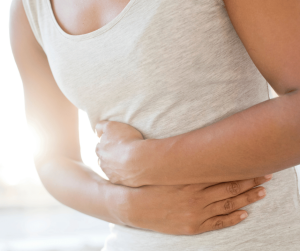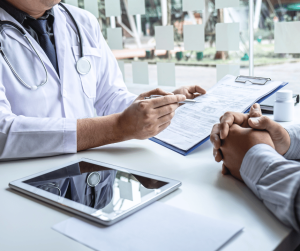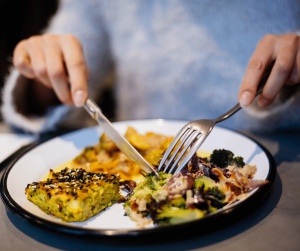If you experience abdominal pain, bloating, or changes in bowel movements, it could be a sign of diverticulitis. This condition occurs when small pouches called diverticula form in the wall of the colon and become inflamed or infected. In this blog post, we will explore the causes, symptoms, and treatment options for diverticulitis.
Causes of Diverticulitis
Diverticulitis is caused by the formation of diverticula, small pouches that can form in the lining of the colon as people age. These pouches are thought to be caused by a low-fiber diet, which makes the colon work harder to push stool through the intestine. When stool is not easily passed through the colon, it can create pressure and cause the lining to bulge out through weak spots in the wall of the colon, creating diverticula. To prevent diverticulitis, it is important to consume a diet high in fiber, as this will help promote regular bowel movements and reduce the likelihood of diverticula formation. Eating foods such as fruits, vegetables, and whole grains can also provide essential vitamins and minerals to help maintain overall health.
Symptoms of Diverticulitis
Diverticulitis can cause a variety of symptoms, including abdominal pain, bloating, constipation, and diarrhea. Other symptoms may include fever, nausea, and vomiting. In severe cases, diverticulitis can cause abscesses or fistulas, which can lead to more serious health problems. To manage symptoms of diverticulitis, it may be helpful to make dietary changes, such as increasing fiber intake and avoiding foods that may aggravate the condition, such as processed foods and refined sugars. Additionally, maintaining a healthy lifestyle, including regular exercise and stress management techniques, can help reduce inflammation and promote overall well-being.
Diagnosis of Diverticulitis
Diverticulitis can be diagnosed through a variety of diagnostic tests, including colonoscopy, CT scan, and MRI. During these tests, a doctor will look for inflammation or infection in the colon. If diverticulitis is suspected, a doctor may also order blood tests to check for signs of infection or inflammation. In some cases, additional testing may be necessary to determine the severity of the condition or to rule out other potential causes of abdominal pain.
When you sit on the toilet, your hips are in a flexed position, which can make it harder for your colon to do its job. Using The PoopSTICK can help alleviate this issue, making it easier to pass poop and reduce the discomfort associated with constipation.
Treatment for Diverticulitis
The treatment for diverticulitis will depend on the severity of the condition. In mild cases, treatment may include rest, antibiotics, and pain relief medication. In more severe cases, hospitalization may be required for intravenous antibiotics and fluids. Surgery may be necessary if complications occur, such as abscesses, fistulas, or bowel obstruction. In addition to medical treatment, lifestyle changes such as increasing fiber intake and avoiding certain foods can help manage symptoms of diverticulitis. Using a device like The PoopSTICK can also help promote healthy bowel movements and reduce discomfort during bowel movements.
Prevention of Diverticulitis
While it is not always possible to prevent diverticulitis, there are steps you can take to reduce your risk of developing the condition or experiencing flare-ups. One of the most effective ways to prevent diverticulitis is to maintain a healthy diet and lifestyle. Eating a diet that is high in fiber and low in fat can help prevent constipation and reduce the strain on your colon. Good sources of fiber include fruits, vegetables, whole grains, and legumes.
In addition to maintaining a healthy diet, regular exercise can also help prevent diverticulitis. Exercise can promote healthy bowel function and reduce stress, both of which can contribute to the development of diverticulitis. Engaging in stress-reducing activities such as yoga or meditation can also be helpful in preventing diverticulitis.
Finally, using The PoopSTICK device can also be beneficial in preventing diverticulitis. The device helps to ensure that your colon is properly emptied during bowel movements, reducing the risk of constipation and straining.
Living with Diverticulitis
If you have been diagnosed with diverticulitis, there are steps you can take to manage the condition and reduce your symptoms. Treatment for diverticulitis typically involves antibiotics to clear up any infection and pain management to alleviate discomfort. In severe cases, hospitalization may be required for treatment and monitoring.
In addition to medical treatment, making dietary and lifestyle changes can also help manage diverticulitis. Your doctor may recommend a low-fiber diet during flare-ups, which can help reduce inflammation in the colon. Once symptoms have subsided, gradually increasing your fiber intake can help prevent future flare-ups.
It is also important to stay hydrated and avoid certain foods that can aggravate diverticulitis symptoms, such as nuts, seeds, and popcorn. Smoking and alcohol consumption should also be avoided, as they can contribute to inflammation and increase the risk of complications.
Conclusion
Diverticulitis is a common and often painful condition that can have a significant impact on your quality of life. While it is not always possible to prevent diverticulitis, maintaining a healthy diet and lifestyle, regular exercise, stress reduction, and using The PoopSTICK device can all help reduce your risk of developing the condition or experiencing flare-ups.
If you are experiencing symptoms of diverticulitis, it is important to seek medical attention to ensure proper diagnosis and treatment. With proper management and care, it is possible to live a healthy and comfortable life with diverticulitis.
Share this with your friends









